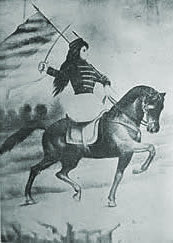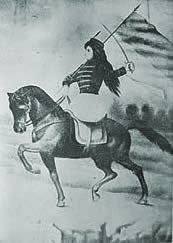
|
Women and Independence in Latin America An exploration of women's involvement in the Latin American Wars of Independence |

|

|
Women and Independence in Latin America An exploration of women's involvement in the Latin American Wars of Independence |

|
Click on one of the images below to see the full-size image
 Tertulia |
Gender:Female
Ethnic origen: Unknown
Events:
| 1777 | - | La Serena | - | Not applicable | - | She was born in La Serena, Chile. |
| 1817 | - | Chile | - | Patriot | - | She was imprisoned in the Monasterio de las Augustinas on 4 January 1817 and released on 12 February 1817 when the republican army defeated the Spaniards. |
Connections:
Female relatives of past and future leading political/military/ cultural figuresBiography:
She was born La Serena, Chile, in 1777. She married Gaspar Marín.
She organised tertulias to promote national sovereignty. (Arambel Guiñazú, 37.)
Knaster states she was active during the Independence struggles, and the mother of Amelia Solar de Claro. (Knaster, 18.)
Grez lists those who attended her tertulias - Camilo Henríquez, Dr Vera, Argomedo, Mackenna, Irisarri, Gaspar Marín. Through Marín, Recabarren was introduced to French literature. She took part in social, historical, and religious polemics in her tertulias. She educated their children: Ventura Marín became a writer and philosopher, Francisco an orator and statesman, and Mercedes Marín de Solar, "una de las poetisas más inspiriadas y fecundas de América. (Grez, 63-65; Weeks, 176-177)
In October 1814 when the Spaniards overcame the patriots, Marín went into hiding. Luisa continued to live in their house, but slipped out at night to meet Marín. Eventually Marín went into exile across the Andes to Mendoza. Luisa's wealth was confiscated by the Spaniards. Patriots nonetheless continued to meet in her house to hear news of the exiles that was brought in letters from Marín to Recabarren. She also kept Marín informed about political developments. She also wrote to Manuel Rodríguez. He was captured in Melipilla and a letter from Recabarren was taken from him. She was interrogated, but gave nothing away. She was then imprisoned on 4 January 1817 in the Monasterio de las Agustinas. She left jail in triumph on 12 February 1817 when the republican army defeated the Spaniards. (Grez, 65-66; Weeks, 176-177.)
References:
Arambel Guinazu, Maria Cristina , Martin, Claire Emilie (2001) Las mujeres toman la palabra: Escritura feminina del siglo XIX. Volume: 1
Davies, Catherine, Brewster, Claire and Owen, Hilary (2006) South American Independence. Gender, Politics, Text
Grez, Vicente (1966) Las mujeres de la independencia
Knaster, Meri (1977) Women in Spanish America: An Annotated Bibliography from Pre-Conquest to Contemporary Times
Weeks, Elsie (1940) Great Chilean Women